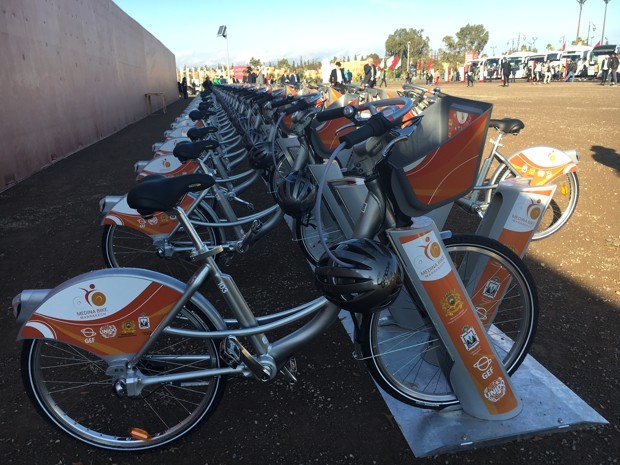Marrakech’s Medina Bike is the latest in a series of projects in the North African country that combat climate change.
Earlier this week, as the United Nations COP22 climate change conference commenced in Marrakech, the Moroccan Minister of the Environment Hakima El-Haiti took a spin on a new bike. And this wasn’t just any bike: El-Haiti rode a “Medina Bike” from the country’s new bike share—the African continent’s first.
Three hundred such “city bikes” (medina means “city” in Arabic) are now available at 10 docking stations throughout central Marrakech, including at the Koutoubia mosque and the 12-acre Majorelle botanic garden. Users can purchase passes for a day, week, or month for 50, 150, and 500 dirhams ($5, $15, and $50 USD), respectively, and are charged 30 dirhams ($3 USD) for each 30 minutes after the first half hour.

The United Nations Industrial Development Organization (UNIDO) conceived of Medina Bike, then invited companies to bid on it. The French firm Smoove, whose bike-shares can be found in such cities as Chicago and Moscow, won the tender, and it partners on the project with a local Moroccan company, Estates Vision. While the UN pegged the launch of Medina Bike to the COP22—and even created a special docking station for the conference’s attendees—the system will remain in place after the event concludes on November 18.
The COP22 aims to lay the groundwork for the implementation of 2015’s Paris Agreement, which nearly 200 nations, including Morocco, signed as a pledge to taper their use of fossil fuels in favor of renewable energy. The goal is to limit global warming to no more than 2 degrees Celsius (3.6 degrees Fahrenheit) over pre-industrial levels. With personal vehicles a major contributor to greenhouse gas emissions—in the United States, for example, cars account for nearly one-fifth of these emissions—more widespread use of eco-friendly options such as bikes is needed.
The launch of Medina Bike, as well the choice of Morocco to host the COP22, reflects the North African country’s policies to combat climate change. Such dedication is necessary: Morocco’s lengthy, 2,175-mile coastline, on which most of its economic activity occurs, makes it particularly vulnerable to the effects of climate change, such as rising sea levels.

Morocco has a goal of generating 52 percent of its energy from renewables by 2030. Projects such as the Noor Solar Power Station are working toward that vision: By its 2018 completion, it will be the world’s largest concentrated solar plant, delivering power to more than a million people. In recognition of such efforts, Morocco ranked as a top-ten country in the Germanwatch and Climate Action Network Europe’s 2016 Climate Change Performance Index—the only non-European nation to place in that bracket.
Medina Bike thus joins a number of initiatives that aim to decrease fossil fuel consumption in the country. And because cycling was a popular mode of transport in Morocco before the rise of the automobile, the hope is that the bike-share will help revive the habit. Hélène Papa, marketing communications manager for Smoove, says the company “wants Moroccans as well as visitors to realize that biking is not only good for the environment, but is the best way to travel short distances.”
The ultimate aim is an ambitious one: to spread this message—and practice—across the continent. “We want Medina Bike to be successful enough to expand to other cities in Morocco and then to Africa as a whole,” Papa says.
Source: Africa’s First Bike-Share Just Launched in Morocco – CityLab







